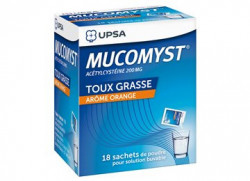Mucomyst (acetylcysteine) Coupons, Discounts & Cost
Mucomyst (acetylcysteine) has mucolytic, expectorant, detoxifying, anti-inflammatory effect. One way to save money on the Mucomyst (acetylcysteine) retail cost regardless of income and insurance status is to use Mucomyst (acetylcysteine) coupons or discount cards from RXCoupons. Use our Mucomyst (acetylcysteine) coupons at your online pharmacy and receive up to 75% off the sale price each time you refill your prescription.
Mucomyst (acetylcysteine) patient information
Mucomyst (acetylcysteine) has mucolytic, expectorant, detoxifying, anti-inflammatory effect. The agent reduces the viscosity of bronchial secretions and significantly increases mucus flow. It has a stimulating effect on mucosal cells, increases glutathione synthesis and activates detoxification processes.
When can you use Mucomyst (acetylcysteine)
This medication is used to remove the secretions from the respiratory tract, keep your chest clear of mucus and prevent excessive mucus production (in bronchitis, tracheitis, bronchiolitis, pneumonia, bronchiectasis). It is also used to treat lung abscess, emphysema, laryngotracheitis, asthma, collapse of lung tissue, catarrhal and purulent forms of otitis media, sinusitis. The drug is also prescribed in preparation for bronchoscopy, aspiration drainage. In addition to pulmonology, it is used as an antioxidant in cardiology, toxicology, during chemotherapy, for organ and tissue transplantation, as well as an antidote to radiation exposure.
Antitoxic properties of Mucomyst (acetylcysteine)
Mucomyst (acetylcysteine) has a strong antitoxic effect. It can be used in acute poisoning with aldehydes, phenols, mercury, arsenic, cadmium and other chemicals. In particular, it acts as an antidote to acrolein contained in cigarette smoke and fried foods; to cyclophosphamide used by oncology patients; to paracetamol in case of acute poisoning.
How should I take Mucomyst (acetylcysteine)
Mucomyst (acetylcysteine) is available for oral, as well as for intramuscular administration. It can be applied to the skin or delivered by inhalation. The dosage is individual for each patient. The normal dosage for adults is 400-600 mg/day in 2-3 divided doses or 300 mg 1 time per day for intramuscular and intravenous administration. Solution for oral inhalation should be given 3-4 times a day (for 15-20 min). Mucomyst (acetylcysteine) (10% solution) can be used for ear and nasal irrigation (1.5-3 ml for 1 procedure).
The duration of Mucomyst (acetylcysteine) therapy is determined individually (not more than 10 days). Patients older than 65 years of age should reduce the dose of Mucomyst (acetylcysteine).
What should I avoid while using Mucomyst (acetylcysteine)
Mucomyst (acetylcysteine) is contraindicated if you have hypersensitivity, gastric ulcer and duodenal ulcer during the active phase.
What should I discuss with my doctor before using Mucomyst (acetylcysteine)
Before using Mucomyst (acetylcysteine), tell your health care provider if you have gastric ulcer or duodenal ulcer, esophageal varices, phenylketonuria, bronchial asthma, adrenal disease, arterial hypertension, liver and/or kidney failure. Patients with broncho-obstructive syndrome should combine Mucomyst (acetylcysteine) with bronchodilators.
It is possible to take Mucomyst (acetylcysteine) during pregnancy only if its benefit outweighs potential risks to the fetus. Women taking Mucomyst (acetylcysteine) should stop breastfeeding.
Possible side effects of Mucomyst (acetylcysteine)
Possible side effects may include:
- Digestive tract: nausea, vomiting, heartburn, feeling of fullness, stomatitis.
- Allergic reactions: skin rash, pruritus, urticaria, bronchospasm (predominantly in patients with bronchial hyperresponsiveness).
- Other possible effects: drowsiness, fever, cough, local irritation of the airways, rhinorrhea.
Mucomyst (acetylcysteine) can cause slight burning pain. Therefore, the medication needs to be injected deep into the muscle mass.
What other drugs may affect Mucomyst (acetylcysteine)
Mucomyst (acetylcysteine) used together with cough suppressants may enhance phlegm accumulation due to the suppression of the cough reflex (these drugs should not be used simultaneously). When combined with antibiotics (such as tetracycline, ampicillin, amphotericin B), this may result in a reduction of drugs activity. Mucomyst (acetylcysteine) reduces the hepatotoxic effects of paracetamol.
Acetylcysteine Brand Names
Brand names: NAC, Mucomyst, Acetadote, Cetylev

